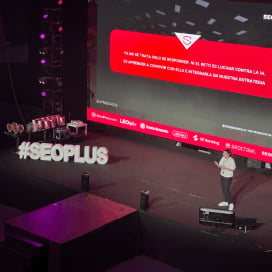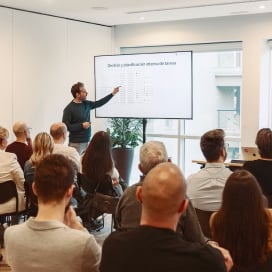Written by Fernando Maciá
Index

Positions obtained
The easiest way to measure the success of an SEO campaign is to measure the positions achieved by the client’s pages in the results of the major search engines. Your website appears among the first 10 results or not at all. Positioning your website among the top 10 results is the promise that most SEO companies make to their clients, even though no budget guarantees that this goal can be achieved within the time frame set for the campaign.
Although search engine rankings are the easiest factor to measure, they are by no means the one that offers the most accurate picture of how well the campaign is achieving its objectives.
Through the positions in which pages appear in search engines, we only know the position occupied by a website for a combination limited to a few search terms, in a few search engines and for searches carried out from a very specific place and at a very specific time.
This means that:
- There is no guarantee that the result that the potential customer will see from that website and the one measured by the SEO company will match.
- The combinations used to measure rankings are usually the most popular, but experience shows that the combination of terms used by search engine users is extremely varied. Half of the searches refer to word combinations used by a single user.
This is why, even though improving search engine rankings for certain search terms is often the most important goal in the search engine ranking process, it is not always possible to achieve the highest search engine rankings for a given search term. first objective of an SEO campaignIt is what happens after this goal is achieved where an SEO service provider can really offer added value to its client.
Turning good jobs into more visitors
The second easiest metric to measure refers to the number of visits registered by the website. If the optimization work has been performed on search terms relevant to the potential visitors of a given portal, the portal should logically register an increase in the number of visitors as well as in the number of page views.
If a better positioning of the portal in the search engine results is not followed by an increase in registered traffic, this means that something has been done wrong in the optimization work: perhaps the keywords chosen for the campaign are not those that would be used by your potential customers, perhaps the description The results shown in the lists of results are not sufficiently attractive compared to those of the competitors above or below them…
Thus, an increase in the number of visitors would be the second measure of quality of a search engine optimization campaign.
In reality, many clients believe that the goal they are paying for is to get higher search engine rankings. However, this is only a means to obtain a higher level of traffic to your website because a good search engine ranking, in itself, does not generate any profitability if it is not through the traffic likely to become a customer that this ranking generates to our website. And here comes the question:
what happens when someone finally clicks on our link on a search engine results page?
Turning visitors into customers
Websites that rank higher in search engines receive more traffic than those ranked lower. Search engine optimization companies try to make their clients’ web portals more visible in search engines: to appear in better positions for a wider variety of search terms related to their activity.
Once the traffic starts to arrive, it is necessary to consider the different strategies with which a website can transform that traffic into customers.
The visitor-to-customer conversion rate is by far the most important metric for evaluating the success of a search engine optimization campaign. For this conversion to take place, it is necessary to have an adequate strategic planning about the objectives to be achieved by the portal, and the way in which it is prepared to obtain them.
The goal is to drive traffic to the portal with one objective or another: in some cases, the goal will be to close a sale. In others, it will be to provide certain information, establish a first contact, act as a reference, etc.
Thus, as a measure of performance, the conversion of visitors into customers is far more valuable than traffic generated or search engine rankings.
Conversions indicate the level of goals achieved, and good SEO companies have the right tools to help increase targeted conversions.
Keywords that generate conversion
A quick analysis of our traffic statistics is enough to discover that, although we can find keywords that generated a high level of traffic to our website, they may not coincide with those that are more likely to have been used by potential customers, i.e, visits with high probability of conversion to customer.
For example, on the Human Level Communications website there is an article in which Mercadona supermarkets are mentioned. This term “Mercadona” is not very competitive in search engines, so this simple article makes this page well positioned. In fact, it is one of the search terms that generates the highest number of visitors to our site. However, the likelihood of someone searching for “Mercadona” in MSN Search becoming a Human Level Communications client is much lower than those searching for “top search engine rankings”, “web traffic analysis” or “internet real estate marketing”. Even though they generate fewer visits, the value of these visits, from the point of view of achieving objectives, is infinitely greater in the latter.
When we detect an increase in traffic from search engines to our website, but this does not translate into an increase in conversions, we may be targeting the wrong keywords. Or, we are getting top search engine rankings for terms that our potential customers do not use.
It is time to investigate what keywords our competitors are using, both in the positions achieved in organic search engine results as well as in the insertion of pay-per-click ads. This can provide us with valuable clues to introduce corrections in our positioning.
We must also analyze on an ongoing basis the web traffic statistics to detect which keywords originated the highest number of page views, the longest time spent on the website, or the arrival at customer conversion pages: quote requests, website registration, recommendation to a third party, file download, etc.
The influence of usability
The most important aspect that influences a visit to a website to become a customer is the usability of the website itself, its navigability, simplicity and predictable behavior by users.
The most frequently converting websites are designed in such a way that their information architecture actively drives visitors to move from one section to another, from “traffic hook” pages to conversion-generating forms.
This same principle of making it easy for visitors to navigate smoothly through the different sections of a web site is applicable to an adequate SEO optimization strategy: the positioning expert will ensure that the search engine spider will be able to reach each and every one of the contents that make up the portal, overcoming obstacles such as Javascript links, drop-down menus, internal search engines, forms, etc. to achieve maximum visibility in search engines.
And finally, sales
Ultimately, every one of our clients’ marketing initiatives is aimed at making a sale. Achieving top rankings in search engines, high traffic or even a high conversion rate means nothing if a website owner does not achieve an adequate return on investment.
However, judging the effectiveness of any Internet initiative by the sales achieved online is misleading.
Still and for a large majority of businesses, the sale, although it may have originated on the Internet, materializes offline. If we take, for example, the fashion sector, we can see that many popular brands of clothing, lingerie, etc. maintain attractive websites that, for sure, have required a significant investment. However, sales of these types of products will ultimately occur at the local store. We can attribute varying degrees of credit for the improvement in sales of this type of product to its promotion on the Web, but it is difficult to know exactly how much.
Conclusion
We have analyzed the advantages and disadvantages of some of the measures commonly used to try to evaluate the success of a search engine optimization campaign. We have seen how the ease of measurement of some of them – search engine rankings, number of visits, etc. – is an advantage that is overshadowed by the biased picture they present.
Ultimately, ROI is the only measure that can really provide us with a definitive judgment as to whether or not an SEO campaign was worthwhile.
Are we generating more profit after optimizing my website for search engines than before? If so, it is quite possible that part of the success can be attributed to a better position in MSN Search, Google or Yahoo! Given the increasingly competitive scenario of the Internet, it will be easy to see how, in the vast majority of cases, the effort to improve our position in the search engines was worthwhile.



